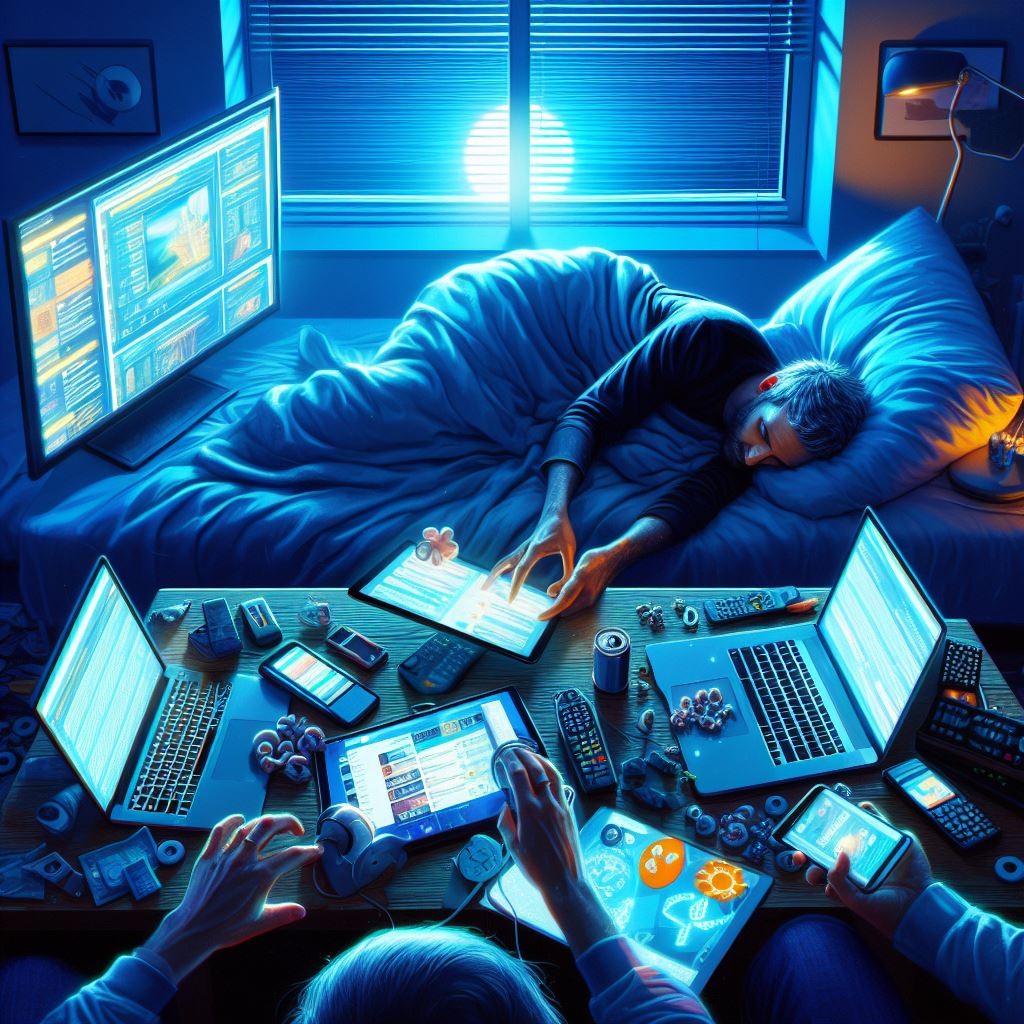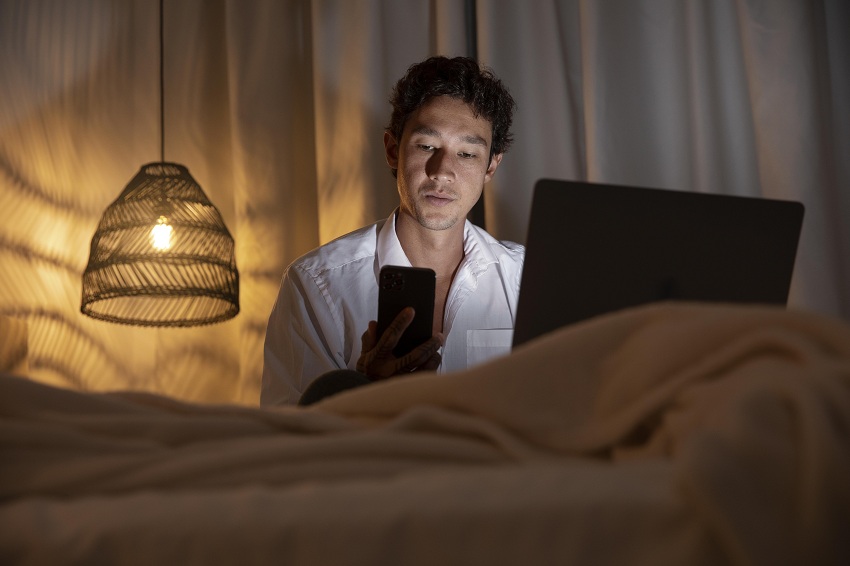It explores the latest research on how screen time impacts the quality of our sleep and offers practical tips technology and insomnia.
In today’s digital age, screens are everywhere – from our phones and tablets to laptops and televisions. While these devices have undoubtedly revolutionized our lives, they have also profoundly impacted our sleep patterns. In this article, we delve into the connection between technology and insomnia, shedding light on how excessive screen time can disrupt sleep.
As we navigate the endless scroll of social media feeds and binge-watch our favorite shows late into the night, the artificial blue light emitted by screens confuses our natural sleep-wake cycle. The stimulation from digital content also keeps our brains wired, making it harder to unwind and fall asleep.
But it’s not just the blue light that affects our sleep. The addictive nature of technology and the constant need to stay connected can lead to increased stress and anxiety, contributing to sleep disorders like insomnia.
We also explore the latest research on how screen time impacts the quality of our sleep and offer practical tips on technology and insomnia for establishing healthy digital habits for a more restful slumber.
Join us as we unravel the complex relationship between technology and insomnia and discover strategies to reclaim a good night’s sleep amidst the screens.
Understanding insomnia: Causes and symptoms
Insomnia is a common sleep disorder characterized by difficulty falling asleep, staying asleep, or both. It can affect people of all ages and can have a significant impact on their daily lives. While there are various causes of insomnia, technology and excessive screen time have emerged as important contributors.
One of the main reasons screens affect our sleep is the artificial blue light they emit. This blue light suppresses melatonin production, a hormone that regulates sleep. When exposed to blue light before bed, our bodies are tricked into thinking it’s still daytime, making it harder to fall asleep at the desired time.
Additionally, the stimulating content we consume on our screens can keep our minds active, making it challenging to relax and unwind before bed. The constant scrolling, rapid information processing, and engagement with social media platforms can heighten our alertness and contribute to sleep disturbances.
Moreover, the addictive nature of technology can lead to increased stress and anxiety, further worsening sleep problems. The constant need to stay connected, the fear of missing out (FOMO), and the pressure to be available can create a sense of restlessness and hinder our ability to achieve a restful slumber.
To read more click here.
The role of screens in insomnia
While screens can be blamed for causing insomnia, they also catalyze other factors that contribute to sleep disturbances. For instance, the excessive use of screens often leads to a sedentary lifestyle, reducing physical activity during the day. Lack of exercise can result in increased restlessness at night and difficulty falling asleep.
Screens can also disrupt our sleep patterns by altering our circadian rhythm. The circadian rhythm is our body’s internal clock that regulates sleep and wakefulness. Exposure to screens before bed can throw off this rhythm, making establishing a consistent sleep schedule challenging and leading to irregular sleep patterns.
Furthermore, the constant exposure to digital screens can disrupt our ability to wind down and relax before sleep. This can be particularly problematic for individuals with high stress levels or anxiety disorders, as the stimulation from screens can exacerbate these conditions and make it even harder to achieve quality sleep.
The Science behind the connection: How screens disrupt sleep

Understanding the Science behind how screens disrupt sleep can help us recognize the importance of limiting screen time before bed. As mentioned earlier, the blue light emitted by screens suppresses the production of melatonin, the hormone responsible for regulating sleep. This suppression can significantly delay the onset of sleep and reduce the overall duration of sleep.
Additionally, screens can interfere with the natural release of other sleep-promoting hormones, such as serotonin. Serotonin is a neurotransmitter that helps regulate mood, appetite, and sleep. When screen time interferes with the production and release of serotonin, it can lead to imbalances, contributing to sleep disturbances.
Screens also impact our sleep through their effect on brain activity. Engaging with stimulating content, such as video games or intense movies, can increase brain activity and make it harder for our minds to transition into a state of relaxation. This heightened brain activity can delay sleep onset and result in fragmented sleep.
Sleep hygiene: Tips for better sleep in the digital age
While it may be challenging to eliminate screens from our lives, there are strategies we can implement to establish healthier digital habits and improve our sleep quality. Here are some tips to consider:
1. Set a screen curfew: Establish a specific time each evening when you will stop using screens. This allows your body and mind to prepare for sleep without the interference of artificial blue light.
2. Create a bedtime routine: Develop a relaxing routine before bed that does not involve screens. Engage in activities like reading a book, taking a warm bath, or practicing relaxation techniques like deep breathing or meditation.
3. Optimize your sleep environment: Create a sleep-friendly environment by keeping your bedroom cool, dark, and quiet. Use blackout curtains, earplugs, or a white noise machine to minimize disruptions.
4. Limit caffeine and alcohol intake: Both caffeine and alcohol can interfere with sleep quality. Avoid consuming these substances before bedtime to ensure they don’t disrupt sleep.
5. Establish a consistent sleep schedule: Try to go to bed and wake up at the same time every day, even on weekends. This helps regulate your body’s internal clock and promotes better sleep.
6. Practice stress management techniques: Incorporate stress management techniques into your daily routine, such as exercise, journaling, or talking to a trusted friend or therapist. Managing stress can significantly improve your sleep quality.
Digital detox: How to reduce screen time before bed
Reducing screen time before bed is essential for improving sleep quality. Here are some practical strategies to help you decrease your screen time:
1. Create tech-free zones: Designate specific areas in your home where screens are off-limits. For example, make your bedroom a tech-free zone to promote relaxation and better sleep.
2. Use screen time tracking apps: Various apps can help you track and limit your screen time. These apps provide insights into your usage patterns and can help you set goals for reducing screen time.
3. Implement screen-free activities: Find alternative activities to engage in before bed that don’t involve screens. This could include reading a book, engaging in a hobby, or spending quality time with loved ones.
4. Set boundaries with technology: Establish clear boundaries with your devices, such as turning off notifications during specific hours or using your phone’s “Do Not Disturb” feature to minimize disruptions.
5. Gradually reduce screen time: If you find it challenging to cut off screens entirely, start by gradually reducing your screen time before bed. Set small goals and slowly decrease your usage over time.
Blue light filters and other technological solutions
While reducing screen time is crucial, there are also technological solutions available to minimize the impact of screens on our sleep. Blue light filters, for example, can be installed on devices to reduce the amount of blue light emitted. These filters adjust the screen’s color temperature to a warmer tone, which is less disruptive to our sleep-wake cycle.
Some devices also have built-in features that adjust the screen’s brightness and color temperature based on the time of day. These features, often called “night mode” or “dark mode,” can be activated to reduce exposure to blue light in the evening.
Additionally, apps and software allow users to schedule device usage limits, block specific apps or websites during certain hours, and even remind users to take breaks from screens at regular intervals. These technological solutions can help individuals maintain healthier digital habits and improve their sleep quality.
Alternative activities before bed: Relaxation techniques and reading
Relaxing activities before bed can help prepare your mind and body for sleep. Instead of scrolling through your phone or watching TV, consider incorporating the following exercises into your evening routine:
1. Reading a book: Reading a physical book or an e-reader with an e-ink display can be a great way to relax before bed. Choose genres that are not too stimulating or suspenseful to promote a sense of calm.
2. Practicing relaxation techniques: Deep breathing exercises, progressive muscle relaxation, or guided meditation can help quiet your mind and prepare your body for sleep. There are numerous apps and online resources available that provide guided relaxation exercises.
3. Listening to calming music or podcasts: Create a playlist of soothing music or calming podcasts focusing on topics like mindfulness, sleep, or relaxation. These auditory experiences help shift your focus away from screens and promote a tranquil state of mind.
Seeking professional help: When to consult a sleep specialist
If you have tried implementing healthy sleep habits and reducing screen time but are still experiencing persistent sleep difficulties, it may be time to seek professional help. A sleep specialist can evaluate your sleep patterns, identify underlying sleep disorders, and recommend appropriate treatments.
Some signs that indicate it may be beneficial to consult a sleep specialist include:
– Chronic difficulty falling asleep or staying asleep
– Frequent daytime sleepiness or fatigue
– Loud snoring or pauses in breathing during sleep
– Restless leg syndrome or other uncomfortable sensations in the legs at night
– Nighttime behaviors, such as sleepwalking or night terrors
Everyone’s sleep needs and patterns are unique, so consulting with a professional who can provide personalized guidance and support is essential.
Conclusion: Balancing Technology and Insomnia for a restful night
While technology has undoubtedly brought numerous benefits to our lives, it’s crucial to recognize its impact on our rest. Excessive screen time, particularly before bed, can disrupt our sleep patterns, hinder our ability to fall asleep and reduce the overall quality of our sleep.
We can reclaim a good night’s sleep by understanding the connection between technology and insomnia, implementing healthy sleep habits, and establishing boundaries with screens. Remember to prioritize sleep hygiene, engage in alternative activities before bed, and seek professional help when necessary.
As we navigate the age of screens, let’s strive for a balanced approach that allows us to enjoy the benefits of technology while safeguarding our sleep and overall well-being.

